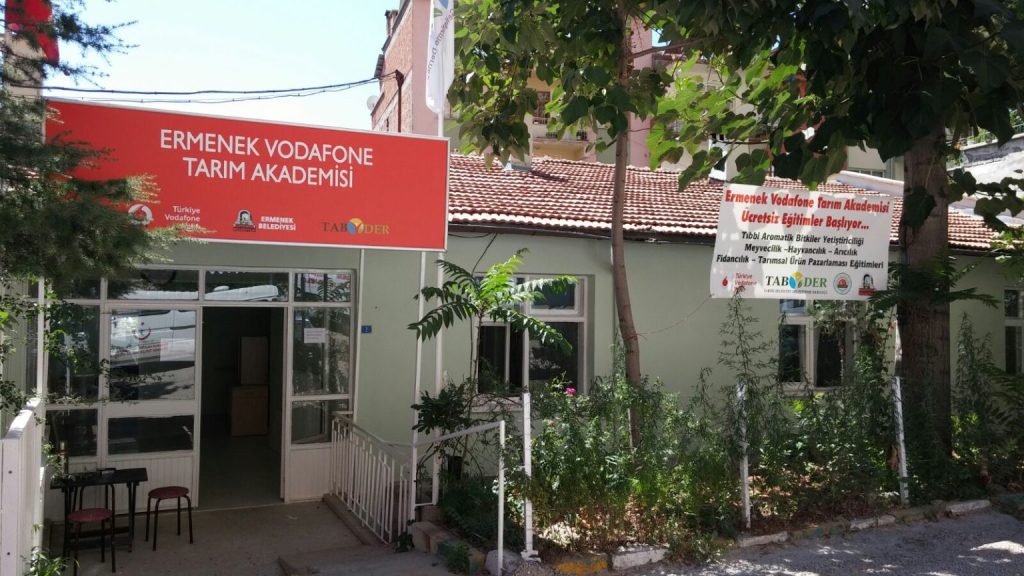
The Ermenek Agricultural Academy Medicinal and Aromatic Plants School Project is an initiative aimed at preserving and cultivating over 400 medicinal and aromatic plant species in the Ermenek region. Seeds of plant varieties threatened by submersion due to a planned dam have been collected and transplanted to higher-altitude areas. The project, established by Tabider Association for Promoting Agricultural Awareness with the support of Vodafone Foundation and Ermenek Municipality, aims to enhance agricultural awareness by providing farmers with knowledge on plant varieties, harvesting periods, and marketing.
The project seeks to prevent the loss of medicinal and aromatic plant species, thereby protecting biodiversity. It also aims to increase economic sustainability by equipping farmers with conscious agricultural production and marketing skills. Through proper cultivation techniques, training provided to farmers, and local engagement, this initiative promotes agricultural awareness while supporting environmental and economic sustainability in the Ermenek region.
Problem Statement
- Plants at risk of submersion: Some medicinal and aromatic plants in Ermenek are at risk of being submerged due to a planned dam, threatening rare plant species.
- Reduction in plant diversity: Areas that will be submerged may see a decrease in plant diversity, endangering local biodiversity.
- Lack of agricultural knowledge: Local farmers lack sufficient knowledge regarding the collection, cultivation, and marketing of medicinal and aromatic plants.
- Economic sustainability: Improper utilization of these plants can negatively impact economic sustainability and reduce local farmers’ income.
Social, Economic, and Environmental Impacts
- Social Impacts:
- Cultural heritage preservation: Submersion threatens local cultural heritage and traditional knowledge. The project aims to safeguard these values.
- Community awareness: Informing farmers about the importance and protection of medicinal and aromatic plants increases local awareness and sensitivity.
- Economic Impacts:
- New income sources: Cultivating and marketing medicinal and aromatic plants creates new revenue opportunities, positively affecting farmers’ economic conditions.
- Local economic revitalization: Recognizing the economic value of these plants stimulates agricultural activity and trade in the region.
- Environmental Impacts:
- Biodiversity conservation: Collecting seeds and cultivating plants in situ supports biodiversity preservation.
- Sustainable agricultural practices: Promoting environmentally friendly cultivation and harvesting methods contributes to eco-friendly farming.
Tabit’s Solution Strategy
- Technology and Innovation: Implement innovative solutions using the latest agricultural technologies to increase productivity and quality, facilitating farmers’ access to these technologies.
- Education and Knowledge Transfer: Organize training and awareness programs for farmers, agricultural experts, and the community to disseminate best practices and share agricultural knowledge.
- Sustainability and Environmental Approach: Promote eco-friendly farming, conserve water and soil resources, and support sustainable agricultural production.
- Market Access and Trade Support: Assist farmers in reaching broader markets, develop marketing strategies, and integrate them into the value chain.
- Collaboration and Partnerships: Establish collaborations with universities, NGOs, private sector, and government institutions to develop and implement more effective solutions.
- Rural Development and Community Engagement: Support economic development in rural communities and design agricultural solutions that meet local needs.
Distinctive Features of Our Approach
- Participatory Approach: Solutions are co-designed with farmers, encouraging active engagement and providing tailored solutions.
- Technology and Innovation Focus: Emphasis on the power of technology and innovation in agriculture to offer more effective and efficient production methods.
- Sustainability and Eco-Friendliness: Solutions are environmentally compatible, preserving natural resources and aligning agricultural production with sustainable practices.
Objectives
- Increase farmers’ income and promote agricultural diversity through in situ cultivation of medicinal and aromatic plants.
- Educate and raise awareness among farmers regarding plant varieties, harvesting periods, and marketing strategies.
- Enhance the agricultural potential of the Ermenek region, promote sustainable farming practices, and contribute to economic development.
Tabit’s Contributions
- Identification and collection of seeds from medicinal and aromatic plants threatened by submersion.
- Provision of training and consultancy for farmers on in situ cultivation of these plants.
- Educating farmers on proper harvesting, processing, and marketing practices.
- Organizing and managing the Ermenek Agricultural Academy.
- Coordinating with stakeholders to support project implementation.
- Regular monitoring, evaluation, and reporting to ensure sustainability and effectiveness.
- Sharing data and experiences to serve as a model for other regions.
Outreach Activities
- Media Relations: Press releases, media events, and interviews to highlight project activities at local and national levels.
- Social Media: Active promotion on platforms like Facebook, Twitter, and Instagram, sharing content and campaigns.
- Website and Blogs: Dedicated website and blogs to communicate project goals, progress, and achievements.
- Events and Workshops: Face-to-face engagement and collaboration with stakeholders through workshops and events.
- Brochures and Flyers: Distribution of printed materials in local venues and events.
- Communication Networks: Regular information sharing with local authorities, NGOs, universities, and other stakeholders.
- Printed Publications: Reports, brochures, and journals to inform stakeholders and the target audience.
Economic Sustainability
- Revenue generation through value-added processing and marketing of medicinal and aromatic plants.
- Income from expert training and certification programs at the Agricultural Academy.
- Support from local and international funds ensures the project’s sustainability.
Sustainable Development Goals (SDGs) Impact
- SDG 1 – No Poverty: Enhances farmers’ income, reducing poverty.
- SDG 2 – Zero Hunger: Improves agricultural productivity and diversity, supporting food security.
- SDG 3 – Good Health and Well-being: Cultivation and use of medicinal and aromatic plants promote health and well-being.
- SDG 8 – Decent Work and Economic Growth: Contributes to economic growth through agricultural production and marketing.
- SDG 12 – Responsible Consumption and Production: Supports efficient use and conservation of natural resources.
- SDG 15 – Life on Land: Protects natural habitats of medicinal and aromatic plants.
- SDG 17 – Partnerships for the Goals: Encourages global partnerships and knowledge sharing through collaboration with local and international institutions.
